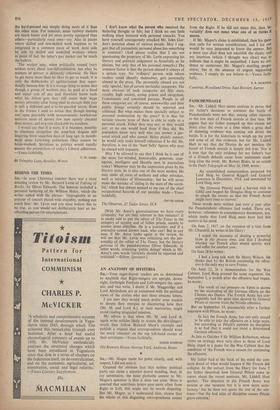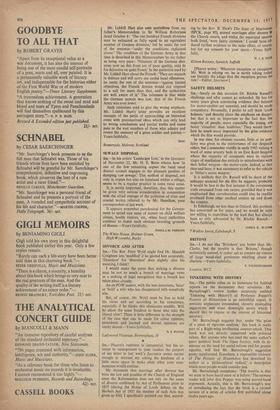PASSCHENDAELE
Sta,—Mr. Liddell Hart seems anxious to prove that my father's decisions to continue the battle of Passchendaele were not due, among other reasons, to the low state of French morale at that time. He argues that my father trumped up this excuse ten years after the event at a time when a great deal of damning evidence was coming out about the battle. It is for the historians to weigh up the pros and cons of all this evidence, but for Mr. Liddell Hart to say that the Diaries do not mention the factor of French morale is simply not true. Nor is it true that the only evidence for my father's fear of a French debacle came from statements made long after the event. Mr. Robert Blake, in an article in the Daily Telegraph on May 26, 1949, wrote :
An unpublished memorandum prepared for Lord Haig by General Kiggell and General Lawrence in December, 1918, and annotated by Lord Haig, says :
'He [General Petain] paid a hurried visit to GHQ and begged Sir Douglas Haig to continue to attack the enemy so that the French Army might have time to recover.'
These words were written just over a year after the Passchendaele offensive had ended. There are, however, references in contemporary documents, too, which imply that Lord Haig must have had this motive in his mind.
On June 2, 1917, on the occasion of a visit from Mr. Churchill, he writes in his Diary:
I urged the necessity of dealing a powerful blow at the present time, and that I doubted whether our French allies would quietly wait and suffer for another year.
On June 28 he writes : I had a long talk with Sir Henry Wilson. He thinks that by the British continuing the offen- sive is the only way to save France.
On June 12, in a memorandum for the War Cabinet, Lord .Haig pressed the same argument. On September 1, a month after the offensive had begun, he wrote:
The result of our pressure on Ypres is shown by the slackening of the German efforts on the Chemin des Dames. The French Army has con- sequently had the quiet time desired by General Main to recover from the Nivelle offensive. But on September 19, presumably after a further interview with Main, he wrote : In fact the French Army has not only ceased to be able to take the offensive on a large scale, but according to Petain's opinion its discipline is so bad that it could not resist a determined German offensive.
As late as October 9 Sir William Robertson, whose views on strategy were very close to those of Lord Haig, urged in a paper for the War Cabinet that the condition of the French was a reason for continuing the offensive.
My father had at the back of his mind the con- stant dread of what would happen if the French did collapse. In the extract from the Diary for June 7 my father described how General Main came to report about the recent mutinies. Mr. Liddell Hart quotes : 'The situation in the French Army was serious at one moment but it is now more satis- factory,' but he does not quote the rest of the sen- tence—'but the bad state of discipline causes Main grave concern.' Mr. Liddell Hart also uses quotations from my father's Memorandum to Sir William Robertson dated October 8: 'The one hundred French divisions may be estimated as fully equal to an equivalent number of German divisions,' but he omits the rest of the sentence—'under the conditions explained above.' The condition of the German Army at that time is described in this Memorandum by my father as being very poor: 'Nineteen of the German divi- sions now on this front are of poor quality, only fit for defensive on quiet fronts.' In the quotation used by Mr. Liddell Hart about the French : 'They are staunch in defence and will carry out useful local offensives,' he omits the rest of the sentence—'against limited objectives, the French Armies would not respond to a call for more than that, and the authorities are well aware of it.' The inference is that while the German morale was low, that of the French Army was even lower.
Such omissions tend to give the wrong emphasis. Mr. Liddell Hart's letter provides an excellent example of the perils of approaching an historical event with preconceived ideas which can only lead to wrong conclusions and partial truths and cause pain to the vast numbers of those who admire and revere the memory of a great soldier and patriot.— Yours faithfully, Bemersyde, Melrose. Scotland
HAIG







































 Previous page
Previous page